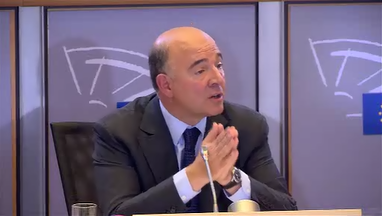„The hearings of the Commissioners-designate are taking a rather democratic turn. For weeks there have been rumours in the European Parliament that a ‚Grand Coalition‘ of the centre-right (EPP) and social-democrat (S&D) groups would mutually support each other’s candidates. However, this agreement has broken down following the hearings of Hill, Cañete and Moscovici. The social-democrats criticised Cañete and the centre-right retaliated by grilling Moscovici. This is a good result for European democracy since otherwise the backroom political dealing would have carried the risk of the European Parliament jeopardizing its right to examine commissioner candidates.
„Pierre Moscovici’s track record as France’s finance minister is far from outstanding. His defence of the arguments of the French financial industry against the fledgling financial transaction tax had a negative impact on it and consequently weakened it. Likewise, his legislative proposal on the structural reform of banks was weak and protected the subsidy-based business models of BNP Paribas and Société Générale.
„Nevertheless, he should be given a chance as Commissioner for economic and financial affairs. He is a convinced pro-European and of the available candidates, only he would be able to achieve a balance in the areas of European economic and financial policies. Moreover, he has credibly committed himself to the struggle against tax evasion and tax avoidance by multinational companies. His first announcements on the need to strengthen transparency and democracy in European economic policy, specifically with regards to the Troika, are a good basis for future work.
But the provision of precise examples would have rendered this annoucement more credible. Moreover, Mr Moscovici did not answer my question, how we would reinstall democractic accountability and transparency in Troika and EU politics. It should be poiinted out that the European Parliament has already provided proposals on how these problems could be effectively tackled and overcome.“

